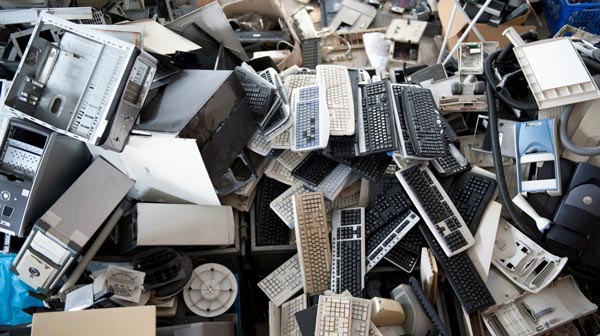Eco-Friendly Electronic Devices Recycling Solutions: Trust the R2 Certification Standard
Wiki Article
Elevate Your E-Waste Administration With R2 Accreditation: an Extensive Overview
One secret approach to elevate e-waste management methods is by achieving R2 qualification. By checking out the benefits and processes associated with R2 accreditation, a much deeper understanding of just how it can revolutionize e-waste administration techniques arises, shedding light on a path towards sustainability and moral disposal practices.Significance of E-Waste Administration

When e-waste is not managed properly, these toxic compounds can permeate into the ecological community, creating harm to wild animals and potentially going into the food web, positioning dangers to human health. Moreover, the inappropriate disposal of e-waste adds to air pollution and greenhouse gas discharges, aggravating climate modification and ecological destruction.

Advantages of R2 Certification

Firstly, R2 accreditation boosts trustworthiness by showcasing a company's dedication to lasting techniques. It guarantees clients, companions, and stakeholders that the firm adheres to stringent standards for e-waste monitoring - r2 certification. This reputation can bring about increased count on and improved connections with clients that prioritize ecological duty
Secondly, R2 accreditation assists minimize risks related to incorrect e-waste disposal. By adhering to the rigorous guidelines stated by the qualification, companies can minimize the possibility of data violations, ecological contamination, and lawful effects. This proactive technique safeguards the firm's reputation and minimizes potential obligations.
Finally, R2 accreditation demonstrates a commitment to ecological stewardship - r2 certification. By sensibly taking care of digital waste via licensed procedures, companies add to the preservation of resources, reduction of contamination, and promo of a round economic situation. This dedication not only benefits the environment but also aligns with progressing customer assumptions for lasting organization practices
R2 Accreditation Process Summary
Having developed the advantages of R2 accreditation in advertising integrity, danger reduction, and environmental stewardship, it is necessary to now outline the detailed procedure entailed in acquiring this certification. The R2 certification procedure begins with a comprehensive review of the company's functional policies and procedures to make certain conformity with the R2 standard. This first evaluation is essential in identifying any type of voids that require to be resolved before continuing additionally.Once the company's practices straighten with the R2 common requirements, an independent third-party auditor carries out an on-site audit to review the execution and efficiency of these techniques. This audit includes a thorough evaluation of documentation, interviews with team, and physical inspections of centers to confirm conformity.
Following an effective audit, the organization gets a qualification decision based upon the auditor's findings. If authorized, the organization is approved R2 certification, demonstrating its dedication to responsible e-waste administration. It is necessary to note that preserving R2 qualification needs recurring compliance with the requirement's needs and periodic audits to guarantee ongoing adherence to ideal practices in e-waste recycling and disposal.
Secret Requirements for R2 Conformity
A necessary facet of achieving R2 compliance is making sure that all digital waste (e-waste) processing facilities meet strict environmental and safety and security standards. To follow R2 requirements, companies should stick to crucial criteria that concentrate on liable e-waste monitoring practices. These requirements consist of applying a recorded ecological, wellness, and safety and security management system, ensuring the protected handling of data-containing gadgets, and conducting extensive downstream due diligence to track the final destination of e-waste materials.Furthermore, R2 compliance necessitates the proper testing, repair, and recycling of electronic tools to expand its valuable life and decrease ecological effect. Facilities looking for R2 accreditation should likewise prioritize worker health and wellness by providing necessary training, individual safety devices, and a safe working setting. In addition, maintaining in-depth records of e-waste handling tasks and consistently undertaking audits by recognized certifying bodies are vital parts of demonstrating ongoing conformity with R2 requirements.
Impacts of Lasting E-Waste Practices
The application of sustainable e-waste techniques based on R2 compliance not just makes certain environmental and safety criteria are satisfied yet likewise considerably influences the general lifecycle of digital products. By sticking to R2 requirements, electronic waste monitoring processes come to be much more reliable, decreasing the ecological footprint of digital products. Lasting e-waste practices promote the proper disposal of digital click to investigate components, making certain that dangerous products are handled properly and do not wind up contaminating the environment.In addition, lasting e-waste practices can contribute to task development in the recycling and repair fields, cultivating financial development while advertising ecological duty. On the whole, the fostering of lasting e-waste techniques under R2 accreditation offers as a critical action in the direction of attaining an extra eco lasting electronic devices market.
Conclusion
To conclude, applying correct e-waste administration practices is essential for ecological sustainability and source conservation. R2 certification plays a vital function in making sure liable handling and disposal of digital waste. By adhering to the strict criteria stated by R2 criteria, organizations can not only decrease their ecological influence however likewise contribute to an extra lasting future for generations to come.One trick approach visit the website to boost e-waste monitoring methods is by obtaining R2 accreditation. By exploring the processes and advantages associated with R2 qualification, a deeper understanding of how it can reinvent e-waste management strategies emerges, shedding light on a course towards sustainability and honest disposal this post practices.
The R2 qualification process starts with a complete review of the organization's functional policies and treatments to ensure conformity with the R2 standard. If authorized, the company is given R2 qualification, demonstrating its dedication to accountable e-waste management. Generally, the adoption of sustainable e-waste techniques under R2 certification offers as an essential action in the direction of achieving a more ecologically lasting electronics market.
Report this wiki page